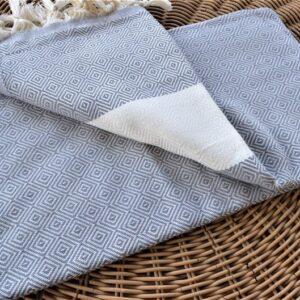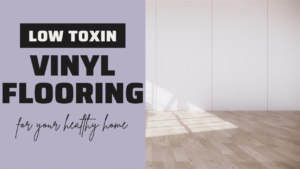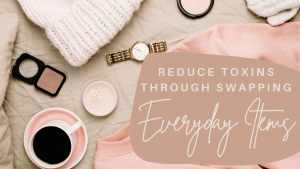
If you’ve taken me up on getting a free copy of The Layering Approach to Create a Healthy House, you know that as you go through each room of your home, a list gets created to guide you into healthy home swaps. Eventually as you go through the rooms in your home, you’ll get to the bathroom. And when you get to the bathroom, you know that towels are probably at the TOP of that list to be swapped out for any type of organic bath towels. And when you get to your kitchen towels, the same type of item will be added to the list I bet.
I love knowing why I’m going to do something. I like to understand the entire story around why I shouldn’t use a product and why I should swap it out with something better. Maybe you’re like me and the information I’m going to share about bath towels and kitchen towels will help you make a permanent change in your home.
Or maybe you like to find trusted brands and products. You like to have all the answers – you don’t really need to know more than “conventional towels can have tons of toxins”. It doesn’t really matter which category you fall into. You’ll notice that in both of these scenarios, the toxic bath towels got swapped out for organic bath towels. Either way I’m here to help with sharing the details on why it’s important to swap out toxic products, but also to share with you some options you can swap them out with.
Throughout this blog post you’ll find out:
- The problems with even the best towels
- How to find organic bath towels and kitchen towels
- My top picks for organic towels (even turkish towels)
- The right way to wash bath towels so they last
I love that swapping out towels in your home will be a one time change that you can repeat in each bathroom or sink of your home. And with each change you’re reducing toxins from your home and your life. Even a small change like swapping out bath towels and kitchen towels keeps you moving forward in creating your own healthy house on the block.
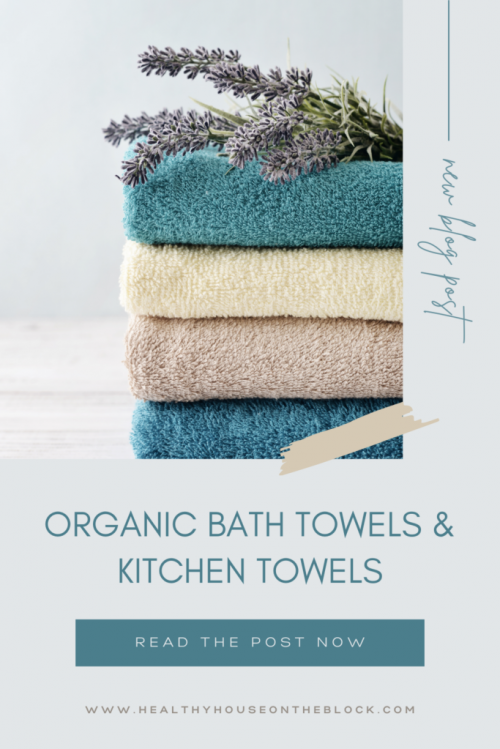
PROBLEMS WITH EVEN THE BEST TOWELS
I’ll warn you, that once I read about the toxins in most towels, it was a real bummer when I dried my face that evening. All I could picture was the toxins I had read being patted all over my face instead of absorbing the water from my skin.
Obviously my overactive imagination was in full force, but the fact is that there are plenty of toxins to be avoided in your everyday towels.
PESTICIDES: I think the biggest culprit in most textiles, including bath towels and kitchen towels, is pesticides. Because cotton is a mass produced plant, oftentimes it requires some level of pesticides to ensure the crop isn’t ruined. In fact, cotton (along with corn, soybeans and wheat) receive about 80% of all the pesticides used in the United States.
Because we’re exposed to pesticides through multiple cotton sources every day (clothing, carpet, textiles, etc.), it’s a toxin that builds up in our bodies and systems. We aren’t able to naturally detox as quickly as we’re coming into contact with this toxin. This inability to detox pesticide toxins quickly enough can cause issues with hormone production and endocrine function, increased risk of Parkinson’s Disease and cancer, and issues with the reproductive system. Children are also at a higher risk of developing ADHD and other developmental defects. (This post on pesticides can explain more about the health effects and products pesticides are found in).
MICROFIBER: When Microfiber (usually within a towel advertised as “super absorbent” became really popular, you better believe I jumped onto that bandwagon. Who didn’t love super absorbent towels and I loved using them for cleaning cloths. But the truth is microfibers are ALL chemicals. Essentially microfibers are man made from a polyester-nylon blend. Microfibers are about a third of the size of a cotton fiber, so they’re exceptionally small.: (often labeled as super absorbent). These tiny particles end up in our laundry and eventually in the earth and water, where they really don’t break down or decompose (as cotton would).
Because microfiber is made from synthetic materials, studies have shown that they expose us to high levels of phthalates and formaldehyde during use. And when we dry microfiber, it also emits more VOCs due to the heat and moisture in the dryer (STUDY). Phthalates are a huge endocrine disrupting chemical that again, is found in many places throughout our home. Being exposed from multiple sources throughout the day means we rarely get a break to detox properly from this toxin.
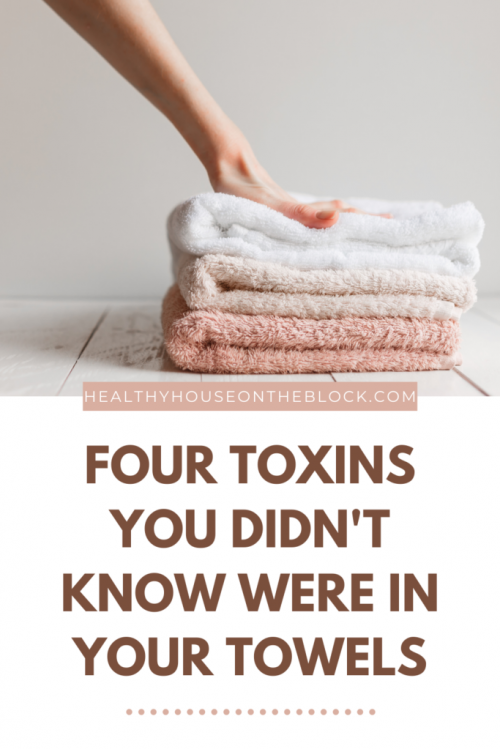
DYES: I used to love all sorts of colorfully dyed bath towels. After all, I grew up in the ‘80s and ‘90s — if you don’t think we had matching wallpaper, towels and rugs adorning our bathroom, you can think again. But the problem with all the colorful towels is that most of them contain toxins in the dyes being used. Of course manufacturers want their color to last, and so in order to have a fade resistant color, chemicals have to be added.
Dyes often contain heavy metals like cadmium, which can lead to kidney issues, bone disease and lung problems. These dyes are often water soluble, meaning they are absorbed into your skin quickly and easily. In addition to the dye itself, formaldehyde is often added to the mix to sustain the dye in the fibers. Formaldehyde is a known carcinogen and harmful to our brain and skin.
FINISHING TREATMENTS: As with any textile that is produced, there are finishing treatments added to make them resistant to just about anything. Hate static-cling? Add formaldehyde. Want to prevent mildew? Add an antimicrobial treatment. Can’t stand stains on your towels? Throw in some chlorine.
Formaldehyde is one of the biggest components added to textiles to prevent a plethora of issues, and unfortunately, it never gets washed out. Formaldehyde is a known carcinogen and stays in the towel fibers forever. Each time you use it and each time you wash it you’re exposing yourself to a toxin that we are getting overloaded with on a constant basis.
Antimicrobial treatments are another toxin we want to avoid as much as possible. Biocide chemicals are used, which are highly damaging to the environment and animals. And on top of this, they contribute to antibiotic resistance in humans.

HOW TO FIND ORGANIC BATH TOWELS & KITCHEN TOWELS
There are so many more options for towels than there ever have been before. You could just head to Target and find an OEKO-Tex Standard 100 bath towel set and call it a day. But there are a few things you want to look for when you’re shopping for a truly organic bath towel:
Organic Cotton: I personally love organic cotton. Cotton is easy to care for and generally pretty durable. The reason it’s so important to find organic cotton is to avoid exposure to pesticides that could potentially be harmful to your body and your space. USDA Certified Organic Cotton is usually listed on the tag.
Other Natural Fibers: You could also find a blend of natural fibers. Again, you want to make sure these are organic (certified organic is best) as they are all plants that can be grown and may contain pesticides if you’re not getting organic. Organic Hemp is a great alternative as it’s naturally mold and mildew resistant. Linen is another material that is often used for towels. Linen is extremely durable and extra absorbent if you like a thinner towel.
Third Party Certifications: The best certification is the Global Organic Textile Standard (GOTS), which regulates the fabric, the dyes, the processing and manufacturing. It ensures every step of the process uses little to no chemicals. The next best certification is the OEKO-Tex Standard 100, which will limit most chemicals on the product.
Unbleached or Natural: Watch out for synthetic dyes. If you find kitchen towels or bath towels that are unbleached or undyed, this is the best option. You could also opt for towels that are colored with natural dyes and natural colorants. If you find a colorful towel that is also GOTS certified, you can bet that the dyes are safe.
No Topical Treatments: Avoid towels that advertise super absorbent or antimicrobial. Unless of course you know that there is no treatment added to give the towels these super powers. Of course natural fibers do have some of these elements, but more often than not, topical treatments can be added to create a towel resistant to stains, mold and mildew.
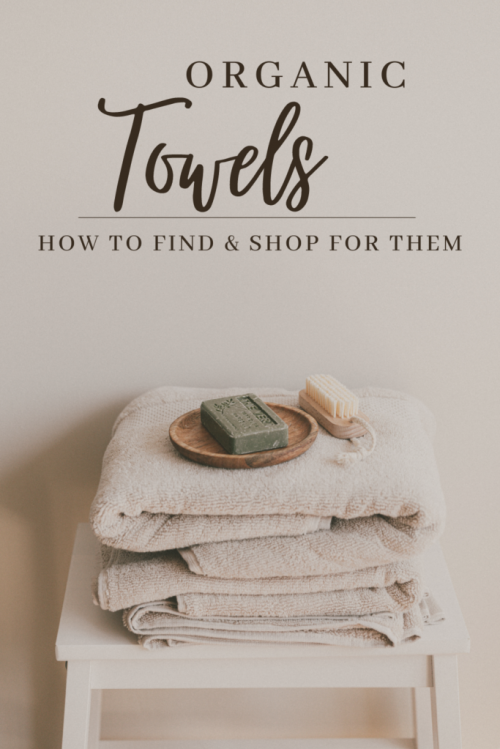
TOP PICKS FOR ORGANIC TOWELS
Click on the Images to Shop the Towels
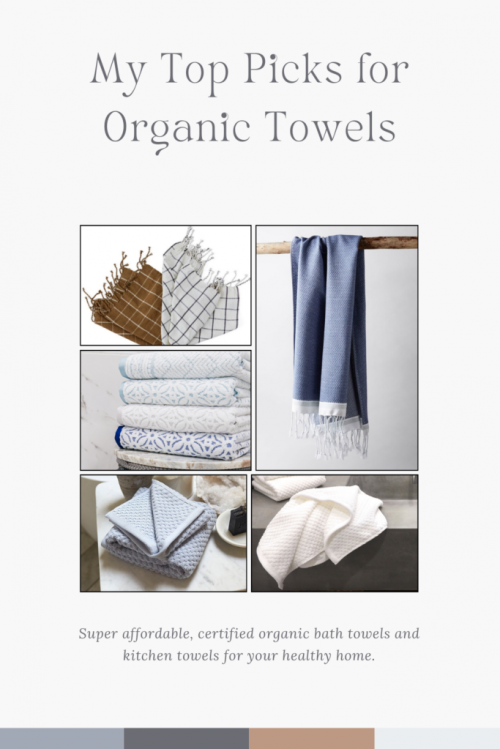
WASHING BATH TOWELS THE RIGHT WAY
When you have towels that are free from all the added treatments, you’ll want to take care for them the right way to prevent issues like mildew from stinking up the fibers. You’ll also want to take care and avoid using chemicals and synthetic fragrance in your laundry products. There’s no use in investing in toxin free, organic bath towels only to add chemicals and toxins to the fibers when you wash them.
Dry Completely Between Uses: Hang up your towel and make sure it has the opportunity to dry out completely before it gets used again. Towels that stay damp are breeding ground for mold and mildew.
Wash in Hot Water: Every three uses you should wash your towel in hot, hot water. Don’t use too much detergent as the detergent can leave residue on the towels that will make it scratchy and rough. A rinse with cold water is best when washing towels.
Vinegar is Your Friend: Typically you want to avoid fabric softener when washing towels as it can make the towels less absorbent. I like to use vinegar in place of softener instead. It actually makes the towels feel softer and don’t worry about the smell. Once dry, there is no vinegar odor.
Dryer Balls with Safety Pins: For fluffy, static free towels, use dryer balls with a safety pin. The balls help tumble the towels and the safety pin will take care of static-cling. Make sure your towels are 100% dry before you remove them from the dryer. You can also line dry towels and finish them up in the dryer for 5-10 minutes.

Towels might be a big investment the first time around. The good news is by purchasing a high quality product like the ones I have listed and washing them the right way, you should be set for a LONG time. It’s one of those products you won’t have to be replacing over and over again. It’s why it can be such a great swap to make as you check off your healthy house list.


